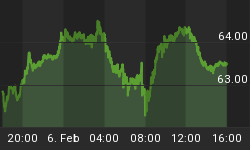Athanasios Orphanides, the former governor of the Central Bank of Cyprus, told Tom Keene and Sara Eisen on "Bloomberg Surveillance" today that Cyprus "will face a deeper recession going forward."
Orphanides also said, "The other periphery countries should thank the Cypriot parliament for rejecting the earlier plan that was advanced about 10 days ago that essentially asked for the confiscation of deposits."
Orphanides on whether the leadership of Cyprus has the support of its citizens:
"I have to say that these are difficult times for Cyprus. But I believe that the Cypriot people have demonstrated that they want to stay in the euro area and they are willing to make sacrifices to that effect. Frankly, let me point out something else that is important from this revision in the euro group deal that came out this morning. The other periphery countries in Europe should thank the Cypriot parliament for rejecting the earlier plan--that was about 10 days ago--that essentially asked for the confiscation of deposits. i think it is a very positive step that because of the rejection of that plan by the Cypriot parliament, we have returned to more traditional ideas and a greater respect of how banking issues should be resolved in a country."
On whether he sees the deal as nothing more than Russian large depositors bailing out Cyprus:
"I don't look at this at all. Let me remind you that there are depositors from Cyprus and all over the world in the major bank that is being shut down, so I would expect that there would be other European citizens as well who will be facing losses as a result. That said, to the extent that a bank had to be resolved, this is the proper way to do this. First, the shareholder should take a hit. Then, the bondholders should take a hit and then, the unsecured depositors. It was a travesty to observe last week European governments asking the Cypriot parliament to impose a confiscation of secure deposits. I'm glad this is behind us. I am not sure that the confidence hit for the European project has gone away, not at all because once we have an arbitrary decision then we need to rely on the parliament of a small country to undo this, we do not know. We cannot tell what is the next arbitrary decision that may happen in Europe."
On what the deal does to the Cypriot economy and the future of the country's banking system:
"This is one of the disheartening elements of what we observe. The agreement that was made confirms the damage that the German government wanted to do to the Cypriot banking system. I should tell you that following the decision of March 16, it was hard to avoid that damage. Here we have an instance where, essentially, Merkel's government acted as the prosecutor, the judge and the executioner of the banking system in Cyprus because of unsubstantiated allegations of Russian money that shouldn't be there. it is very sad that the other European governments did not actually account for the pain that these events have created in Cyprus. Clearly, Cyprus will face a deep recession going forward. I would have expected to see some solidarity from other European governments in order to ease the recession that is coming up. It is unfortunate that that is not forthcoming, but that does not surprise me. We do not see the solidarity that is supposed to be there in the European Union. I will say this, the Cypriot people are very proud and resilient people. If you had a map of the region earlier on, Cyprus over the millennia has suffered so much because of its strategic location. I have no doubt that the Cypriot people will rise again and persevere."
On whether the IMF helped or hinder the Germans and people of Cyprus:
"My understanding is that the IMF had aligned itself very closely to the German government's position. This is a reflection of the dysfunction of how Europe works right now. Local politics appear to dominate completely. The IMF as an international institution cannot change that. This is a flaw, a deep flaw in Europe. We have the September 2013 elections in Europe, Cyprus unfortunately got into the middle of the arguments between Merkel's government and the SPD Party and the position in Europe. This is what forced events in Cyprus. I would not look outside Europe for this fundamental friction in Europe."















